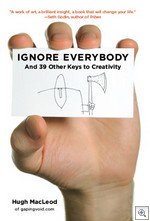Book review – Ignore everybody: And 39 other keys to creativity
I’ve set an ambitious goal for this June: 30 days, 30 book reviews. I’m going to start with what probably was my favorite book from last year, Ignore Everybody: And 39 Other Keys to Creativity, by Hugh MacLeod (the author and I are not direct relatives).
Things I liked about the book

Each chapter is short. Just enough to give you some context and get you thinking about your life and your job. And think you will…
MacLeod is a popular cartoonist. He punctuates his writing with some of his art. Awesome.
Key quotes
Here are a few key quotes:
Good ideas alter the power balance in relationships. That is why good ideas are always initially resisted. (p. 2)
Boy, I’ve lived this one several hundred times over the past few years. Either I’m ahead of my time (in my field) or I’m completely insane. Time will tell!
AND
Your wee [creative] voice came back because your soul somehow depends on it. There’s something you haven’t said, something you haven’t done, some light that needs to be switched on, and it needs to be taken care of. Now.
So you have to listen to the wee voice or it will die … taking a big chunk of you along with it. (p. 28)
The peer-review publication paradigm – where your writing goes in places that educators never visit – never made a lot of sense to me. Blogging and other social media have given me different outlets and a different voice. And I’m much, much happier for it. My wee voice was crying out for something different. I just didn’t know it.
AND
Don’t make excuses. Just shut the hell up and get on with it. (p. 82)
AND
The ease with which a blog (or whatever social medium you prefer) can circumvent the gatekeepers is staggering. (p. 140)
Questions I have after reading this book
- Am I brave enough to never publish a peer-reviewed article again?
- Is there enough space in my day job as a professor to accommodate my non-peer-review writing and social media passions?
- What should I be working on next? Where do I want to go and what do I want to be doing in 5 years?
- How do I reach school leaders when most are not yet active in social media?
- How many graduating high school seniors can I give this book to before a parent complains about the language (some of which is a bit crude)?
Rating
I give this book 5 highlighters (out of 5) to reflect a) the amount of yellow ink in my copy, and b) the affirmation of much of what I believe (or would like to believe) about myself and my work. Extra credit for the author’s last name!

[See my other reviews and recommended reading]





